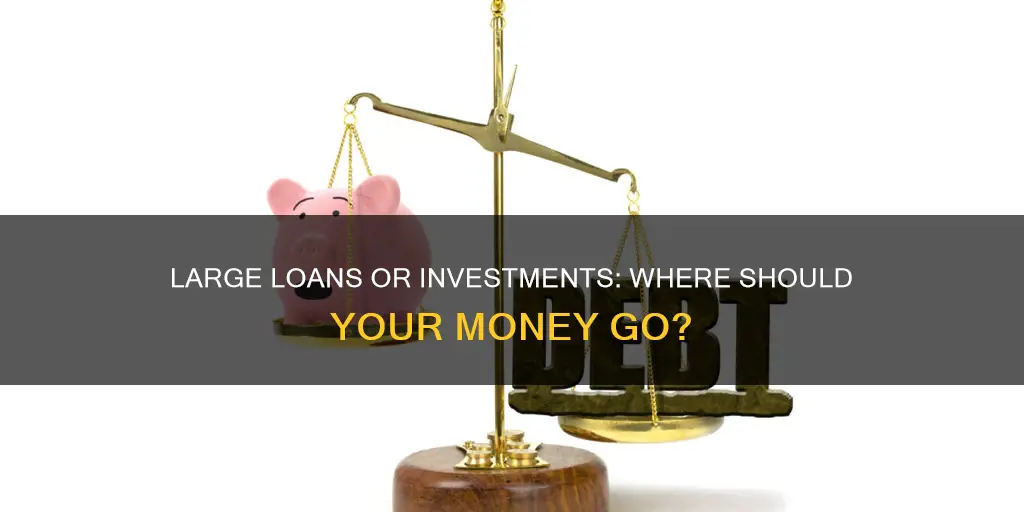
Whether to pay off large loans or invest depends on a number of factors, including the type of loan, interest rates, investment opportunities, and personal financial goals.
Paying off high-interest debt and investing excess funds can be great ways to achieve your financial goals. However, you might have to choose one strategy over the other. Financial planners often recommend paying off loans first, but investing money can be a better choice in some situations.
If you have high-interest debt, such as credit card debt, it often makes more sense to focus on wiping out the debt as quickly as possible, rather than trying to invest. Credit card interest rates often run at 25% or more, far above the rate of return on your average investments. By tackling high-interest debt first, you could save hundreds or even thousands of dollars in interest.
On the other hand, if you have a loan with a low-interest rate, such as a mortgage with a 3% interest rate, it might make more sense to invest your excess money rather than pay off the loan early. Historically, investing in the stock market has returned around 10% on average, so you would likely earn more by investing than you would save by paying off the loan early.
It is also possible to do both: pay off loans and invest at the same time. This approach can be especially effective if your employer offers a 401(k) match, allowing you to take advantage of free money while also paying down your debts.
Ultimately, the decision to pay off large loans or invest depends on your individual financial situation and goals. It is important to consider the interest rates on your debts, your ability to stay on top of debt payments, your risk tolerance, and your retirement timeline when making this decision.
| Characteristics | Values |
|---|---|
| Interest rates | Compare the interest rates of your debt with the expected return on investment. If the interest rates on your debt are higher than the expected return on investment, it is better to pay off the debt first. |
| Risk tolerance | Assess your risk tolerance when deciding whether to pay off debt or invest. Investing carries more risk than paying off debt, but can potentially earn you more money. |
| Tax implications | Consider the tax benefits of carrying certain debts, such as tax deductions for student loan interest and mortgage loan interest. |
| Credit score | Paying off debt can improve your credit score, especially if you pay off credit card debt or loans with high-interest rates. |
| Financial goals | Determine your financial goals and priorities. If becoming debt-free is a top priority for you, then paying off debt may be the better option. |
| Retirement timeline | Consider your retirement timeline when deciding whether to pay off debt or invest. It is generally recommended to avoid bringing debt into retirement. |
| Emergency fund | Ensure you have an emergency fund before deciding whether to pay off debt or invest. This will help cover unexpected expenses and prevent you from taking on more debt. |
| Budget | Evaluate your budget and cash flow to determine if you have any extra money to allocate towards debt repayment or investment. |
What You'll Learn

The pros of paying off debt first
Paying off debt first, especially high-interest debt, is often recommended by financial planners. Here are some advantages of prioritising debt repayment over investing:
- Improved cash flow and reduced expenses: Paying off loans or credit cards can reduce your monthly expenses and improve your cash flow, freeing up money to achieve other financial goals.
- Better credit score: Paying off debt can improve your credit score, as creditworthiness is partly determined by whether you pay loans on time as agreed. A good credit score can make it easier to borrow money in the future, rent an apartment, or open utility accounts.
- Predictable interest payments: Paying off debt removes the unpredictability of paying more interest if you have a variable interest rate loan. Variable interest rates can fluctuate with market conditions, making it harder to predict and manage your debt repayment.
- Peace of mind: Being debt-free can provide peace of mind and reduce stress. It can be psychologically beneficial to eliminate debt, especially if it is causing you anxiety or sleepless nights.
- Focus on other financial goals: Once your debt is paid off, you can focus on other financial goals, such as investing for retirement or saving for a down payment on a house.
- Avoid high interest rates: Credit cards often have high interest rates, typically 20% or more. By paying off credit card debt first, you can avoid these high interest charges, which can save you a significant amount of money in the long run.
- Improved credit utilisation ratio: Paying off debt, especially credit card debt, can lower your credit utilisation ratio, which is the amount of credit you are currently using compared to your total credit limit. A lower credit utilisation ratio, ideally below 30%, can improve your credit score and make you appear less risky to creditors.
Tithing on Investments: To Give or Not to Give?
You may want to see also

The benefits of investing early
Investing early in life is a smart and easy way to build wealth. Here are some benefits of investing early:
Time allows you to take risks
The ventures that are more volatile yield the highest return on investment. Investors who start early have the time to recover if something goes wrong, and can thus make riskier moves.
Compound interest
Compound interest is the interest earned on interest. By continuously reinvesting your earnings, you exponentially increase your return on investment. The earlier you start, the more time your money has to earn compound interest.
Improved spending habits
Investing early allows you to develop disciplined spending habits by focusing on a balanced budget and cutting expenses when needed.
Be a step ahead of everyone else
The earlier you begin investing, the better your personal financial situation will be down the line. You will be able to afford things that others can't and will be prepared to face financial instability.
Improved quality of life
Early investment will reduce the risk that you'll be forced to make reckless choices to secure a stable retirement.
College: A Risky Bet?
You may want to see also

How to decide between paying off debt and investing
Weighing up your options
Whether you choose to pay off debt or invest depends on your financial situation and goals. It's a good idea to speak to a financial advisor to help you decide, but there are some key things you can consider when weighing up your options.
Interest rates
One of the most important factors to consider is the interest rate on your debt. If you have high-interest debt, such as credit card debt, it usually makes more sense to focus on paying this off first. Credit cards often have interest rates of 20% or more, which is much higher than the average return on investments. By paying off this debt first, you'll save money on interest charges.
On the other hand, if you have low-interest debt, such as a mortgage or student loan with an interest rate of 5% or less, you may be better off investing your money instead. Over time, the returns on your investments could outweigh the interest you're paying on your debt.
Your budget
Take a look at your budget to see how much money you have coming in and going out each month. If you're struggling to cover your basic expenses, it's probably a good idea to focus on paying off your debt first. This will free up more of your budget and reduce the stress of debt hanging over you.
However, if you have money left over each month after covering your expenses, you may want to consider investing it to help you work towards your financial goals.
Emergency fund
Before you decide to pay off debt or invest, make sure you have an emergency fund in place. This will help you cover unexpected expenses, such as car repairs or medical bills, without having to rack up more debt. Aim to save enough to cover at least three to six months' worth of expenses.
Retirement plan
Don't forget to consider your retirement plan when making your decision. Many employers will match a percentage of your 401(k) or 403(b) contributions, so be sure to take advantage of this perk before focusing all your efforts on debt repayment or investing.
Doing both
You don't necessarily have to choose between paying off debt and investing – you can do both at the same time. This will help you prepare for retirement while also reducing your debt. Start by creating a detailed budget that outlines your income and expenses, and set specific goals for yourself.
Risk tolerance
Finally, consider your risk tolerance when making your decision. Investing in the stock market can be volatile, and you may see your portfolio go up and down. If you're comfortable with this risk and have a long time horizon, investing may be a good option for you. However, if the thought of losing money in the market keeps you up at night, you may be better off focusing on paying off your debt first.
Student Loans vs. Investing: Navigating the Trade-offs
You may want to see also

The emotional side of paying off loans or investing
When it comes to money, people's emotions can play a significant role in their decision-making. Some individuals strongly dislike debt and would prefer to pay off loans rather than invest, regardless of the interest rate. On the other hand, some people might have accumulated a substantial amount of debt and would instead take a chance by investing their money.
It is crucial to consider both the logical and emotional aspects when deciding whether to pay off loans or invest. Financial planners often recommend paying off loans first, especially those with high or variable interest rates, such as credit cards. However, in certain situations, investing money may be a wiser choice.
- Risk Tolerance: When investing, it is essential to assess your risk tolerance. If you are comfortable with the potential ups and downs of the market and can handle the risk, investing may be suitable. However, if you prefer seeing your money grow steadily over time and dislike market volatility, paying off loans may be a more comfortable choice.
- Interest Rates: If your debt has a low-interest rate, it may not significantly impact your financial situation, and you can sleep well at night. In contrast, high-interest debt, such as credit cards, can quickly accumulate and become challenging to manage. In such cases, paying off the debt first may be more prudent.
- Credit Score: Paying off loans, especially when done promptly, can improve your credit score. A good credit score is essential for various aspects of your financial life, including obtaining future loans, renting an apartment, or even job opportunities.
- Investment Opportunities: If you have identified lucrative investment opportunities with potential returns exceeding your loan's interest rate, investing your money may be more advantageous. However, it is essential to carefully assess the risks and potential volatility of such investments.
- Peace of Mind: Consider what gives you peace of mind. If being debt-free is essential for your mental well-being, paying off loans may be the priority. On the other hand, if you are concerned about missing out on investment opportunities and potential long-term gains, investing may be a better emotional decision.
In conclusion, when deciding whether to pay off loans or invest, it is crucial to consider both the logical and emotional aspects. Working with a financial professional can help you navigate these factors and develop a strategy that aligns with your financial goals and emotional needs.
Inheriting Wealth: How to Invest
You may want to see also

Tips for managing debt and investing
- It is recommended to pay off high-interest debt before investing. High-interest credit card debt, for example, can be very costly over time and challenging to pay off. By tackling it first, you could save a lot of money in interest.
- If you have student loans or a mortgage, consider refinancing to lock in a lower interest rate. A lower rate could mean smaller monthly payments, allowing you to pay more towards the principal and reduce future interest payments.
- With credit cards, a balance transfer or debt consolidation loan might be an option. A 0% APR balance transfer offer could give you a set number of months to repay credit card debt with no interest.
- If you have extra money to invest, make sure you're investing it in the right places. Take time to compare different online brokerage accounts and their investment options and fees.
- If your employer offers a 401(k) or similar plan, be sure to contribute enough each year to get the full employer match if one is offered.
- Before deciding whether to pay off debt or invest, it's important to have an emergency fund in place. This will help cover unexpected expenses, such as car repairs or medical bills, without increasing your debt. Aim for a long-term goal of three to six months' worth of expenses.
- If you're deciding between paying off debt and investing, review the numbers. Compare your expected investing return vs. how much interest you are paying.
- Consider your risk tolerance and how much debt you can handle. If debt is causing you a lot of stress, there is nothing wrong with paying it off sooner, even if investing might offer a higher return.
Toxic People: Invest Time Wisely
You may want to see also
Frequently asked questions
Advantages of paying off loans before investing include reducing monthly expenses, improving your credit score, and removing the unpredictability of paying more interest if you have a variable interest rate loan.
Investing instead of paying off loans can make sense if you can earn more on your investments than your debts are costing you in interest. For example, if you have a mortgage with a 3% interest rate, and you're investing in the S&P 500, which has earned about 10% annually since the 1950s, you'd be better off investing.
It's important to consider your risk tolerance and the interest rates you're paying on your debt. If you have a loan or credit card with a low-interest rate, you may be better off investing, as your money could earn more in interest than the interest you're paying on your debt. However, high-interest rates that outpace potential returns are a strong argument for paying off debt first.







